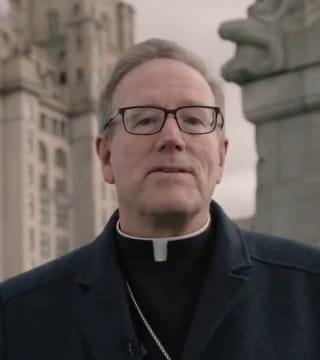Robert Barron - Call-and-Response of the Mass (03/08/2024)
I am in Liverpool, England. I'm on the banks of the Mersey River on a kind of chilly evening. Just arrived here. I'm speaking tomorrow at the Eucharistic Congress and giving two talks one of which will be on the mass I figured a Eucharistic Congress: What better topic than the mass? I know I've spoken often about the mass to you before. I mention the mass as a form of play. Meaning it's the highest, most useless kind of activity we can engage in the best.
I also talk about mass as an encounter with the Lord. We, we talk to him, and then we sit down at table with him, the way we'd visit with a friend. It's an encounter. I want to say a word now about a third dimension of the mass. Namely, it's a kind of call and response Open your Bibles to the Song of Songs, that beautiful poem. It's a love song between these two young lovers, one calling out to the other, the other responding, back and forth. Well, the Mass is a call-and-response between Christ, who is head of His mystical body, and us, who are members of that body. It's a kind of love song. Christ calling out, we responding to him. And in that process the mystical body being knit together, being built up.
And what am I talking about? Well, look how the mass you know begins with the priest Operating in Persona Christi, we say right in the very person of Christ addresses the people the Lord be with you He's not speaking in his own name He's speaking in the person of Christ and the people respond and with your spirit and that response is very interesting Why not just you know? And also with you we'll see and with your spirit means they're acknowledging the Spirit of Christ that dwells in him so a mystical conversation between the head and the members of the mystical body is Established now look at the mass as it unfolds as a steady back-and-forth Christ speaking the people responding it's clearest, of course in the Liturgy of the word time of Conversation the people do sit and they listen to the readings from the Scriptures.
Not what are those not just you know ancient literature. They are the Word of God Speaking to us even now Vatican. 2 specifies that when the lecter or the priests speak it's not so much they who speak its Christ who's speaking through them? Well having heard the word the people Respond, there's the responsorial song and they they respond with that beautiful song book of the church that ancient set of prayers and poems we call the Psalms and they Express all the different modes of human feeling there's anger in the Psalms. There's joy in the Psalms. There's Thanksgiving in the Psalms There's frustration in the songs. That's why they're a perfect vehicle for this response to the Word of God We hear the gospel. And then the Gospels is followed by the homily.
It's very interesting moment because the homily in one way is a continuation of the gospel It's a opening up of the word Christ continues to speak to his people through the priest but the good homily is also the people speaking back So the the good homilist channels in a way the aspirations the frustrations the concerns of his people So the homily in itself is a kind of call and response a Very interesting moment and too often people see it as Oh a little hiatus in the middle of mass that we all stand and recite The Creed, but think about it. We've heard the Word of God It's been broken open for us in the sermon then what do we do? We stand up and in this kind of one-page summary of the biblical revelation.
I think of the Creed that way second in one page summing up the Bible and what do we say? I? Believe I believe I believe The Creed is a beautiful response to the Word of God also the prayers of the faithful Having heard the word of the Lord having heard the great things. He's done over salvation history. We are now filled with confidence And so we can bring our cans our needs before the Lord We respond to him precisely with our prayers See in a way the whole mass has this structure It kind of comes to rich expression in the liturgy the word but the whole mass call-and-response call-and-response.
The head and the members of the mystical body becoming knitted together. I'll just make a last point as a pivotal moment It's a little prayer that's often overlooked. But when the priest is about now to move into the Eucharistic prayer Made you my sacrifice and yours. He says the people be acceptable to God the Father Almighty You see it's Christ's head and members now United to make the one great sacrifice to the Father it's the moment when head and members now have Fully come together and are ready for the sacrifice Maybe think about that. Next time you go to Mass You're not just you know, passively receiving something you're not just sitting watching a theatrical performance No, no you're involved in this lively call-and-response the mystical body now coming together

